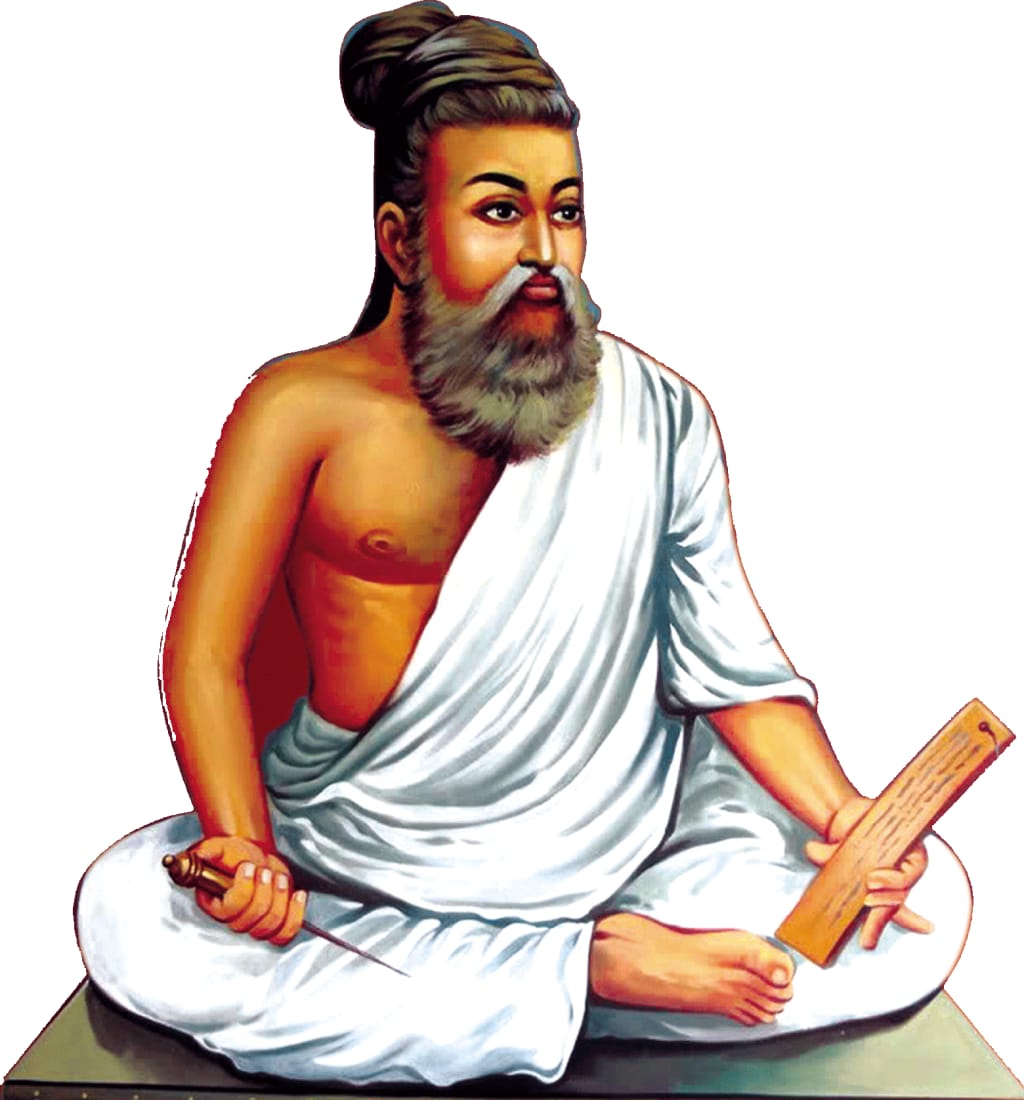
Thiruvalluvar was a celebrated Tamil poet and philosopher who is believed to have lived in South India around 2,000 years ago. He is best known for his work, Thirukkural, which is a collection of 1,330 couplets that cover a wide range of ethical and moral principles.
According to legend, Thiruvalluvar was born to a poor family in Mylapore, a town in present-day Tamil Nadu. His father, a weaver, died when he was young, and Thiruvalluvar was raised by his mother. Despite their humble circumstances, Thiruvalluvar was a gifted student and showed a keen interest in literature and philosophy from an early age.
As he grew older, Thiruvalluvar became a wandering ascetic, traveling across South India and studying under various teachers. It is believed that he spent several years in the city of Madurai, which was then the capital of the Pandya kingdom. During his time in Madurai, Thiruvalluvar met and married Vasuki, a woman from a wealthy family.
Thirukkural, Thiruvalluvar's magnum opus, is divided into three sections: Aram (virtue), Porul (wealth), and Inbam (love). Each couplet expresses a moral or ethical principle and is structured in a way that is easy to remember and recite. Thiruvalluvar's aphorisms cover a wide range of topics, including education, honesty, compassion, greed, and the transience of worldly pleasures.
Thiruvalluvar's work has had a profound impact on Tamil culture and society. His teachings continue to be studied and revered by people from all walks of life, and his influence can be seen in everything from Tamil literature and music to politics and governance. Today, Thiruvalluvar is widely regarded as one of the greatest poets and philosophers in Indian history.The Tirukkuṟaḷ (Tamil: திருக்குறள், lit. 'sacred verses'), or shortly the Kural (Tamil: குறள்), is a classic Tamil language text consisting of 1,330 short couplets, or kurals, of seven words each.[4] The text is divided into three books with aphoristic teachings on virtue (aram), wealth (porul) and love (inbam), respectively.[1][5][6] Considered one of the greatest works ever written on ethics and morality, it is widely acknowledged for its universality and secular nature.[7][8] Its authorship is traditionally attributed to Valluvar, also known in full as Thiruvalluvar. The text has been dated variously from 300 BCE to 5th century CE. The traditional accounts describe it as the last work of the third Sangam, but linguistic analysis suggests a later date of 450 to 500 CE and that it was composed after the Sangam period.[9]
The Kural text is among the earliest systems of Indian epistemology and metaphysics. The work is traditionally praised with epithets and alternative titles, including "the Tamil Veda" and "the Divine Book."[10][11] Written on the ideas of ahimsa,[12][13][14][15][16] it emphasizes non-violence and moral vegetarianism as virtues for an individual.[17][18][19][20][21][a] In addition, it highlights virtues such as truthfulness, self-restraint, gratitude, hospitality, kindness, goodness of wife, duty, giving, and so forth,[22] besides covering a wide range of social and political topics such as king, ministers, taxes, justice, forts, war, greatness of army and soldier's honor, death sentence for the wicked, agriculture, education, abstinence from alcohol and intoxicants.[23][24][25] It also includes chapters on friendship, love, sexual unions, and domestic life.[22][26] The text effectively denounced previously held misbeliefs that were common during the Sangam era and permanently redefined the cultural values of the Tamil land.[27]
The Kural has influenced scholars and leaders across the ethical, social, political, economic, religious, philosophical, and spiritual spheres over its history.[28] These include Ilango Adigal, Kambar, Leo Tolstoy, Mahatma Gandhi, Albert Schweitzer, Ramalinga Swamigal, V. O. Chidambaram Pillai, Karl Graul, George Uglow Pope, Alexander Piatigorsky, and Yu Hsi. The work remains the most translated, the most cited, and the most citable of Tamil literary works.[29] The text has been translated into at least 40 Indian and non-Indian languages, making it one of the most translated ancient works. Ever since it came to print for the first time in 1812, the Kural text has never been out of print.[30] The Kural is considered a masterpiece and one of the most important texts of the Tamil literature.[31] Its author is venerated for his selection of virtues found in the known literature and presenting them in a manner that is common and acceptable to all.[32] The Tamil people and the government of Tamil Nadu have long celebrated and upheld the text with reverence.[19]





Comments (1)
https://youtu.be/FwOnH3R9Lec?si=ZogXwijPhnRlsRsi